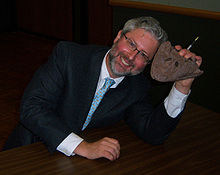Neil Shubin
Appearance

Neil Shubin (born December 22, 1960) is an American paleontologist, evolutionary biologist and popular science writer.
Quotes
[edit]- Your Inner Fish: A Journey Into the 3.5-Billion-Year History of the Human Body. New York: Vintage Books. 2008. LCC QM26.S58 2008. ISBN 9780307277459.
- Everything changes when we look at the evidence; what looks impossible actually happened.
- Chapter 1 “Finding Your Inner Fish” (p. 6)
- The order of fossils in the world’s rocks is powerful evidence of our connections to the rest of life.
- Chapter 1 “Finding Your Inner Fish” (p. 8)
- Just as Darwin’s theory predicted: at the right time, at the right place, we had found intermediates between two apparently different kinds of animals.
- Chapter 2 “Getting a Grip” (p. 39)
- Do the facts of our ancient history mean that humans are not special or unique among living creatures? Of course not. In fact, knowing something about the deep origins of humanity only adds to the remarkable fact of our existence: all of our extraordinary capabilities arose from basic components that evolved in ancient fish and other creatures. From common parts came a very unique construction. We are not separate from the rest of the living world; we are part of it down to our bones and, as we will see shortly, even our genes.
- Chapter 2 “Getting a Grip” (p. 43)
- Take the entire 4.5-billion-year history of the earth and scale it down to a single year, with January 1 being the origin of the earth and midnight on December 31 being the present. Until June, the only organisms were single-celled microbes, such as algae, bacteria, and amoebae. The first animal with a head did not appear until October. The first human appears on December 31. We, like all the animals and plants that have ever lived, are recent crashers at the party of life on earth.
- Chapter 7 “Adventures in Bodybuilding” (pp. 119-120)
- Our fish ancestors had internal and external nostrils, too, and to nobody’s surprise these are the same fish that have armbones and other features in common with us.
- Chapter 8 “Making Scents” (p. 143)
- What do billions of years of history mean for our lives today? Answers to fundamental questions we face—about the inner workings of our organs and our place in nature—will come from understanding how our bodies and minds have emerged from parts common to other living creatures. I can imagine few things more beautiful or intellectually profound than finding the basis for our humanity, and remedies for many of the ills we suffer, nestled inside some of the most humble creatures that have ever lived on our planet.
- Epilogue (p. 201)
- The Universe Within: The Deep History of the Human Body. New York: Vintage Books. 2013. LCC QE28.S526 2013. ISBN 9780307473271.
- For thousands of years, mankind considered itself the pinnacle of life’s creation on a planet sitting in the center of the universe. Science changed that perception. Leavitt, Hubble, and others helped us see that we live near the margin of a vast galaxy, in a universe of galaxies, with our planet one of many worlds. Darwin and the biologists had their say too. Our entire species is but one little twig on an enormous tree of life filled with all life on earth. But each discovery that moves us from the center of creation to some obscure corner brings an entirely new relation between us, other species, and the entire universe.
- Chapter 2 “Blasts from the Past” (p. 24)
- Humans are a timekeeping species, and much of our history can be traced to the ways we parse the moments of our lives.
- Chapter 4 “About Time” (p. 60)
- The thrill of the scientific hunt is to have an idea whose truth is hitched to predictions that take us to new places to explore, objects to discover, and data to analyze.
- Chapter 7 “Kings of the Hill” (p. 132)

